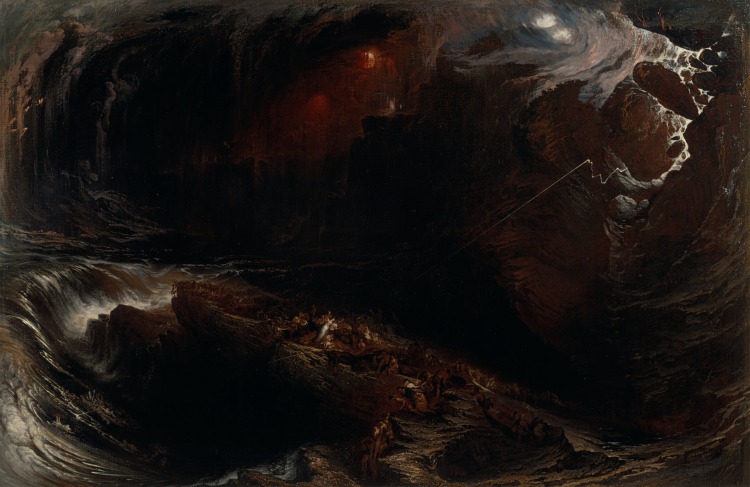Since I’m involved in organising a conference on “Religions, Environments and Popular Culture” (*shameless plug* for this 26 September event with a CFP live until 20 June) it was fairly essential that I should see the Noah movie, and it provided the perfect excuse for a committee social.
I went wearing my cynical hat and I left feeling shell-shocked from sitting too close to the screen for being bombarded with the CGI sequences (note to self – arrive earlier than normal on the day of the week when a certain mobile network offers 2for1 tickets). I’m neither inclined nor really able to add anything of substance to most of the fields of discussion which the film has prompted. Instead I’m going to run with a few thoughts on “what would Blake make of it?”
Broadly-defined as a re-telling of a Biblical story, the genre of Aronofsky’s epic is a long tradition in which Blake participated, by which he was deeply influenced (Milton’s Paradise Lost, for instance), and which he has probably influenced in turn. For instance, in Jerusalem, he re-tells the story of Jesus’ birth, imagining Mary as an adulteress, and he writes his own “Everlasting Gospel” which retells various events in the life of Jesus.
What Blake would do with today’s technology if he were alive today is the silly sort of question which gets thrown around now and again. The physicality of Blake’s works is strongly felt and expressed in his writings on art which makes it tempting to say that he would dismiss digital technology, but had he grown up in the twentieth/twenty-first centuries his ideas might have been rather different!
Specific details of Aronofsky’s epic might, however, be more substantively reflected upon qua Blake. For instance, one of the oddest details for me was the CGI Adam and Eve in the Garden of Eden: they looked like shop mannequins made of nuclear matter – strange, glowing figures, lacking in proper human musculature. Of this, I’m fairly sure Blake would not approve: he celebrates the full physicality of the human form to the point that his own figures are supra-real, with exaggerated musculature and ridiculously long limbs (this wasn’t because he couldn’t draw bodies accurately – we know he could because there are drawings from his formative years where he’s copying from classical sculptures). See, for example, his own depictions of Eden, illustrating Paradise Lost (and on bodies, see my post All manner of bodies – there will probably be more to come in this vein so I will resist rambling on further here).
The Flood was quite a popular subject for painters in Blake’s time, appealing to the aesthetic of the sublime – famous examples include those of JMW Turner, John Martin (see below) and Francis Danby. But for Blake, the sublime was not to be found in vast, dramatic landscapes, but in grains of sand, wild flowers and the terrifying ghost of a flea (perhaps there is, after all, a hint here to what Blake might make of the big-screen epic – Martin’s paintings are, after all, often cited as a pre-cursor to the cinematic epic). His own take on the Deluge is a little picture of the flood waters and the rainbow (I can’t find an image of the original online, but here’s William Bell Scott’s etching after the picture).

John Martin (1789-1854), The Deluge, 1834, Oil on canvas, Yale Center for British Art, Paul Mellon Collection
Blake also refers to the Flood, and to other parts of the Noah narrative, in a number of works. The example I’ve found most interesting (bearing in mind I’ve only really looked into this after seeing the film) is the inclusion Noah and his sons Shem and Japhet in his Vision of the Last Judgement, representing “Poetry Painting & Music the three Powers in Man of conversing with Paradise which the flood did not Sweep away.” The Flood resonates with his idea of “cleansing the doors of perception” or, in the language of A Vision of the Last Judgement, “whenever any Individual Rejects Error & Embraces Truth a Last Judgment passes upon that Individual.”
If Blake had built an Ark, we can have a good idea of some of those he would want to be swept away by the waters of the flood – Joshua Reynolds, Bishop Watson, Newton, Bacon and Locke are just a few of those who meet the wrath of Blake’s pen. Who he would save is less straightforward to answer. I wonder if he’d welcome Aronofsky on board?
You must be logged in to post a comment.